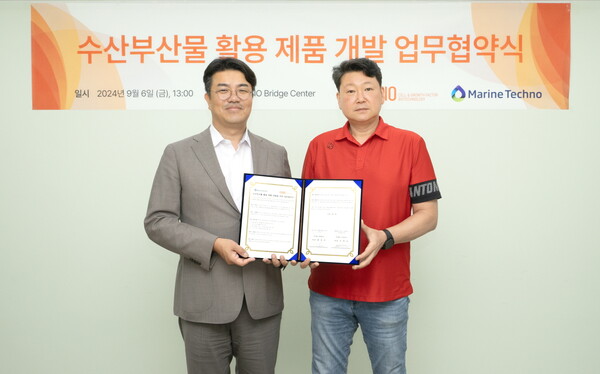In the growing search for safer and more sustainable alternatives to traditional medical materials, collagen derived from marine by-products is gaining significant traction. With its high biocompatibility and low risk of immune rejection, this marine-sourced collagen may help address safety concerns associated with xenografts.
On Tuesday, CG Bio, a Korean bioregenerative medicine developer, said that it has signed a memorandum of understanding (MOU) with Marine Techno, a marine biomaterials processing company, taking a step in advancing the field of bioregenerative medicine through the development of products from fishery by-products. The signing ceremony, held at CG Bio’s Yongsan headquarters, “marks the beginning of a collaboration that could revolutionize tissue regeneration by commercializing the untapped potential of marine resources,” according to CG Bio.

Fishery by-products—bones, fins, shells, and the like, once discarded during the capture, harvest, and processing of fish—are emerging as a sustainable solution to the chronic shortage of human tissue donors. These natural materials hold the potential to meet the growing demand for allogeneic tissue supply in medical treatments.
But progress hasn’t come easily. Legal restrictions on licensing and safety management have shackled efforts to repurpose these marine materials for medical use, while the lack of infrastructure kept innovation at bay. However, with recent deregulation fueling interest in marine-sourced biomaterials, discussions about developing medical products from these by-products have gained momentum.
“This agreement is not just about developing products,” a CG Bio official said. “It’s about harnessing sustainable resources and protecting the environment.” CG Bio is actively promoting environmental, social, and governance (ESG) management with a focus on social responsibility and sustainability.
A key part of this effort is recycling fishery by-products into medical materials, which the company sees as a way to achieve core ESG goals like resource conservation and environmental protection. “By converting these by-products into high-value materials,” the CG Bio official explained, “we aim to set best practices for corporate social responsibility while contributing to a sustainable future.”
What was once cast aside or underutilized, fishery by-products are now being processed and converted into medical products, promoting resource recycling and contributing to a circular economy in marine resources.
Marine Techno will handle the processing of marine by-products, removing foreign substances and impurities to transform them into medical-grade materials, while CG Bio will oversee the commercialization process.
"This partnership goes beyond mutual gain," said Yu Hyun-seung, CEO of CG Bio. "It's about transforming marine bio-materials into high-value assets." He added that the company is committed to developing cutting-edge medical technologies from these resources and launching competitive products worldwide, “leading the charge in sustainable ESG management by recycling materials and fostering a circular economy."
Related articles
- CG Bio targets Chinese bone graft market with synthetic option amid allogenic graft scandal
- CG Bio hosts seminar in Bangkok to showcase advanced trauma treatment techniques
- 16 doctors from Middle East join CGBio’s clinical training event in Seoul
- CGBio’s spinal implant Novomax Fusion enters Japanese market

